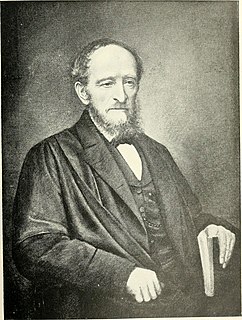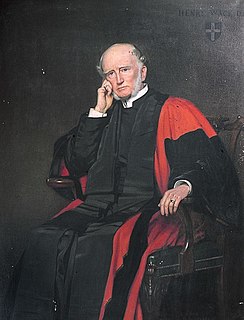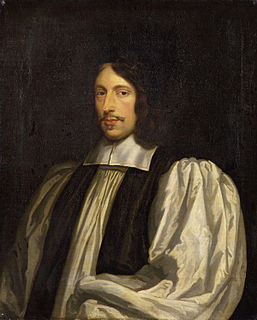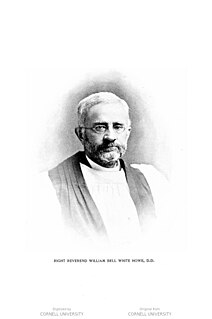Related Research Articles

Lincoln College is one of the constituent colleges of the University of Oxford, situated on Turl Street in central Oxford. Lincoln was founded in 1427 by Richard Fleming, the then Bishop of Lincoln.

Mark Pattison was an English author and a Church of England priest. He served as Rector of Lincoln College, Oxford.

Henry Wace was an English Anglican priest and ecclesiastical historian who served as Principal of King's College, London, from 1883 to 1897 and as Dean of Canterbury from 1903 to 1924. He is described in the Dictionary of National Biography as "an effective administrator, a Protestant churchman of deep scholarship, and a stout champion of the Reformation settlement".

Jacob Thompson was the United States Secretary of the Interior, who resigned on the outbreak of the American Civil War and became the Inspector General of the Confederate States Army.

Nathaniel Crew, 3rd Baron Crew was Bishop of Oxford from 1671 to 1674, then Bishop of Durham from 1674 to 1721. As such he was one of the longest serving bishops of the Church of England.

William Lort Mansel was an English churchman and Cambridge fellow. He was Master of Trinity College, Cambridge from 1798 to his death in 1820, and also Bishop of Bristol from 1808 to 1820.

John Prideaux Lightfoot was an English clergyman who served as the rector of Exeter College, Oxford from 18 March 1854 until his death and as vice-chancellor of Oxford University from 1862 to 1866. He was the president of the Oxford Architectural Society from November 1854 to November 1855.
Thomas Marshall was an English churchman and linguist, Rector of Lincoln College, Oxford and Dean of Gloucester.
John Harding was an English churchman and academic. He was Regius Professor of Hebrew at Oxford from 1591 to 1598, and President of Magdalen College, Oxford, from 1607. He was also involved in the translation of the Authorized King James Version, becoming leader of the First Oxford Company of translators after the death of John Rainolds.
John Cottisford was an English churchman and academic, Rector of Lincoln College, Oxford from 1518.
Francis Knyvett Leighton was an English academic and priest, who was Warden of All Souls College, Oxford, from 1858 until his death.

Smith Thompson was a US Secretary of the Navy from 1819 to 1823 and a US Supreme Court Associate Justice from 1823 to his death.
Edward Tatham (1749–1834) was an English college head, clergyman and controversialist, Rector of Lincoln College, Oxford from 1792 to his death.
James Ingram was an English academic at the University of Oxford, who was Rawlinsonian Professor of Anglo-Saxon from 1803 to 1808 and President of Trinity College, Oxford from 1824 until his death.

George John Trevor Spencer was an Anglican bishop in the 19th century and a member of the Spencer family.
George Wynne Jeudwine was an eminent Anglican priest in the first third of the twentieth century.
George Gresley Perry (1820–1897) was an English churchman and academic, known as a church historian and Archdeacon of Stow.

For the railroad engineer and architect see W. B. W. Howe, Jr.
Thomas Bevan was Archdeacon of St David's from 1833 until his death.
George Saxby Penfold was a Church of England clergyman, Rector of several parishes and active as a visiting preacher. In 1825 the University of Oxford awarded him the degree of Doctor of Divinity. A pluralist, for much of his life Penfold held the living of more than one benefice at once.
References
- ↑ British History On-line
- ↑ Foster, Joseph (1888–1892). . Alumni Oxonienses: the Members of the University of Oxford, 1715–1886 . Oxford: Parker and Co – via Wikisource.
- ↑ 'University Intelligence Death of the Rector of Lincoln College' The Times Thursday, 27 December 1860 Issue 23814 p.10
